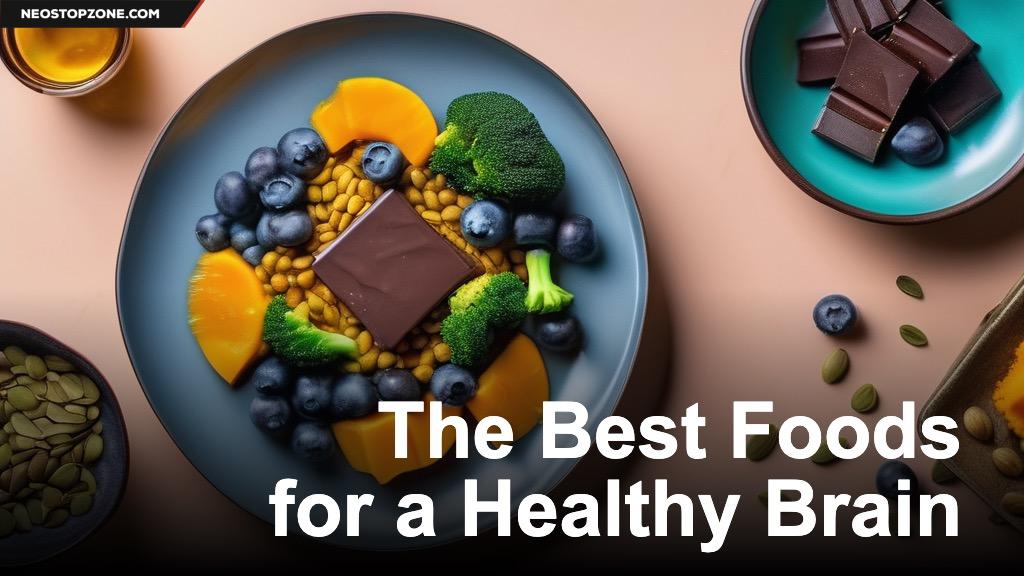
Introduction:
In today’s fast-paced world, maintaining a healthy brain is crucial for overall well-being and cognitive function. While factors like exercise, sleep, and mental stimulation play a significant role, our diet also plays a vital role in supporting brain health. In this article, we will explore some of the best foods that can nourish and boost our brain power.
Blueberries: The Brain’s Best Friend
Blueberries are often hailed as a superfood for their numerous health benefits, and when it comes to brain health, they are truly exceptional. Packed with antioxidants and phytochemicals, blueberries can improve brain function and delay age-related cognitive decline. Their high flavonoid content helps to improve memory and enhance learning abilities.
Fatty Fish: The Omega-3 Powerhouse
Fatty fish like salmon, trout, and sardines are rich in omega-3 fatty acids, which are essential for brain health. Omega-3s play a crucial role in building brain cell membranes and reducing inflammation, leading to improved brain function and a reduced risk of mental decline. Regular consumption of fatty fish has also been linked to a lower risk of depression and anxiety.
Turmeric: The Golden Spice for Brain Health
Turmeric, the vibrant yellow spice commonly found in curry dishes, contains a compound called curcumin. Curcumin has powerful anti-inflammatory and antioxidant properties that can cross the blood-brain barrier, promoting brain health. It has been found to enhance memory and stimulate the production of brain-derived neurotrophic factor (BDNF), a protein that promotes the growth of new brain cells.
Broccoli: The Nutrient Powerhouse
Broccoli is a cruciferous vegetable packed with nutrients that are beneficial for brain health. It is rich in antioxidants, vitamin K, and choline, which are known to support brain function and improve memory. The high levels of glucosinolates in broccoli also help to reduce inflammation and protect against neurodegenerative diseases.
Pumpkin Seeds: The Tiny Brain Boosters
Pumpkin seeds are a nutritional powerhouse, packed with antioxidants, magnesium, iron, zinc, and copper. These nutrients are essential for brain health, as they support neurotransmitter function and improve cognitive performance. The rich antioxidant content in pumpkin seeds also helps to protect the brain from free radical damage.
Dark Chocolate: The Sweet Treat for Brain Power
Good news for chocolate lovers! Dark chocolate, with at least 70% cocoa content, is not only a delicious treat but also beneficial for brain health. It contains flavonoids, caffeine, and antioxidants that can enhance focus, improve mood, and boost cognitive function. The flavonoids in dark chocolate also increase blood flow to the brain, improving memory and attention.
Oranges: The Vitamin C Boost
Oranges are not only refreshing but also a great source of vitamin C. Vitamin C is essential for preventing mental decline and age-related brain degeneration. It is a potent antioxidant that helps to combat oxidative stress and protect brain cells from damage. Including oranges and other vitamin C-rich fruits in your diet can support brain health and improve cognitive function.
Conclusion:
Incorporating brain-boosting foods into our diet is a simple yet effective way to support brain health and enhance cognitive function. Blueberries, fatty fish, turmeric, broccoli, pumpkin seeds, dark chocolate, and oranges are just a few examples of the many foods that can nourish our brains. By making conscious choices and including these foods in our meals, we can take a proactive approach towards maintaining a healthy brain and enjoying optimal cognitive abilities throughout our lives.
FAQs:
1. Are these foods beneficial for people of all ages?
Yes, these foods are beneficial for people of all ages. A healthy brain is essential at every stage of life, and consuming these foods can support brain health at any age.
2. How much of these foods should I consume to see a noticeable difference?
While there is no specific quantity mentioned, incorporating these foods into your diet on a regular basis can have long-term benefits for brain health. Aim for variety and moderation.
3. Can these foods prevent or cure neurological disorders such as Alzheimer’s or Parkinson’s disease?
While these foods can support brain health, they cannot prevent or cure neurological disorders on their own. However, a healthy diet combined with other lifestyle factors may contribute to overall brain health.
4. Are there any potential side effects of consuming these foods?
In general, these foods are safe for consumption. However, individuals with specific allergies or medical conditions should consult their healthcare provider before making any dietary changes.
5. Can I still enjoy these foods if I follow a specific dietary restriction, such as a vegetarian or gluten-free diet?
Absolutely! Most of these brain-boosting foods are versatile and can be incorporated into various dietary restrictions. For specific concerns, consult a nutritionist or dietitian who can provide personalized guidance.
